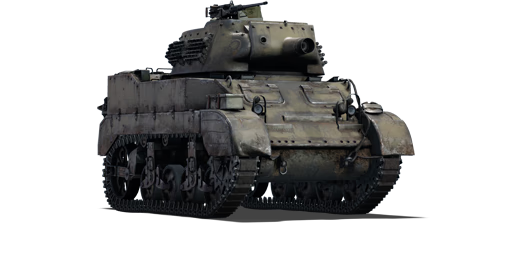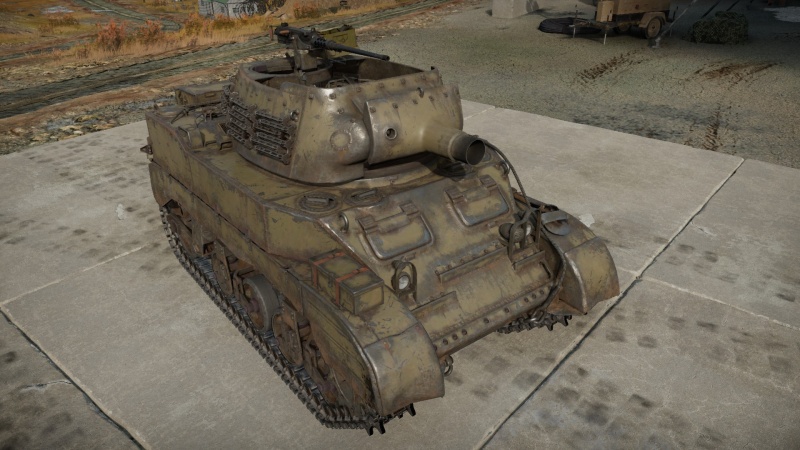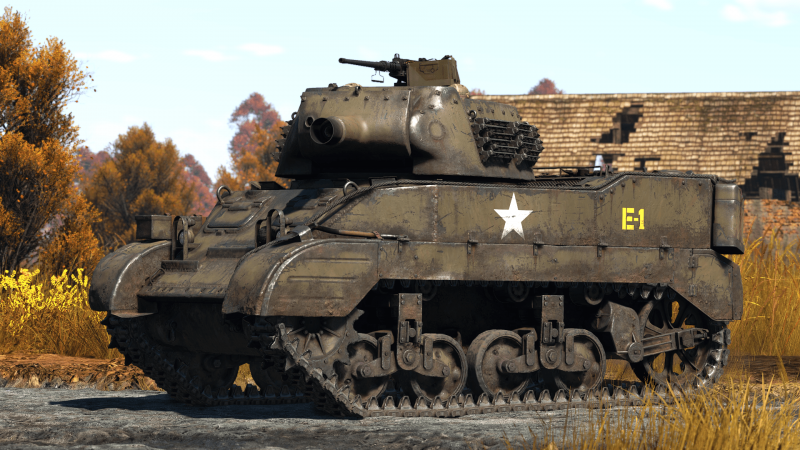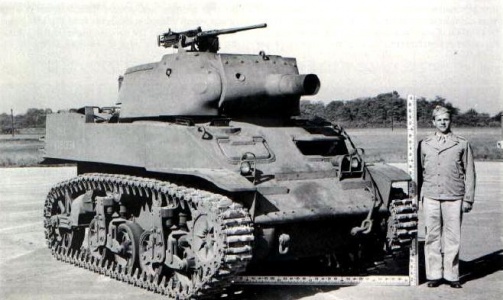Difference between revisions of "M8 Scott"
Colok76286 (talk | contribs) (Edits) |
(→Pros and cons) (Tag: Visual edit) |
||
| (4 intermediate revisions by 2 users not shown) | |||
| Line 14: | Line 14: | ||
== Description == | == Description == | ||
<!-- ''In the description, the first part should be about the history of the creation and combat usage of the vehicle, as well as its key features. In the second part, tell the reader about the ground vehicle in the game. Insert a screenshot of the vehicle, so that if the novice player does not remember the vehicle by name, he will immediately understand what kind of vehicle the article is talking about.'' --> | <!-- ''In the description, the first part should be about the history of the creation and combat usage of the vehicle, as well as its key features. In the second part, tell the reader about the ground vehicle in the game. Insert a screenshot of the vehicle, so that if the novice player does not remember the vehicle by name, he will immediately understand what kind of vehicle the article is talking about.'' --> | ||
| − | The ''' | + | The '''75 mm Howitzer Motor Carriage M8 (M8 HMC)''' is a self-propelled howitzer vehicle used by the U.S. Army during World War II. It was built on the chassis of the Light Tank M5 and was armed with an M116 howitzer mounted on an M7 mount. Similarly to how the [[LVT(A)(4)]] evolved from the [[LVT(A)(1)]] as the 37 mm M6 tank gun proved insufficient for the fire support role, trials with a close-support version of installing the same 75 mm M2 howitzer began first with the Light Tank M3 chassis. However, such a design is inherently problematic as the tank is nose-heavy and can tilt forward during driving. They also deemed the fighting compartment to be extremely cramped. This design was immediately revised by transferring the same 75 mm M2 howitzer to the new Light Tank M5 chassis, which included a new engine and a new fighting compartment design with a well-sloped front that gave greater room and significantly improved protection. Following that, additional modifications were made, including replacing the fixed combat compartment with a new manually rotated turret mounting the same tank gun to allow greater space for the crew. The prototype was eventually designated the 75 mm Howitzer Motor Carriage M8. |
| − | + | Introduced in [[Update 1.67 "Assault"]], the M8 HMC has a similar playstyle to the LVT(A)(4), but with a smaller profile and greater mobility. Since the primary 75 mm M2 howitzer fires low-velocity projectiles, long-range engagement is undesirable. However, given the low velocity of the shells, it is possible to engage opponents who are not in the line of sight, such as by moving behind low obstacles and firing shells in a short arc to target enemies behind the cover. Nonetheless, it is a unique vehicle with a different playstyle than the typical light tanks used by the U.S. Army ground forces in the early ranks. | |
== General info == | == General info == | ||
| Line 59: | Line 59: | ||
{{main|M2 Howitzer (75 mm)}} | {{main|M2 Howitzer (75 mm)}} | ||
| − | Thanks to its HEAT shell, the M8 Scott's firepower can handle everything with ease, from destroying soft targets with overpressure like the LVT(A) to knocking out common foes like | + | Thanks to its HEAT shell, the M8 Scott's firepower can handle everything with ease, from destroying soft targets with overpressure like the LVT(A) to knocking out common foes like the [[Chi-Ha (Family)|Chi-Ha]] with a single shot to piercing tough adversaries like the [[B1 bis|B1]] and [[Matilda III|Matilda]]. The extremely slow turret traverse makes close quarter combat super challenging. Its short gun is also bad for long range engagements: it requires the player to be crystal clear of what they are doing, and have great situational awareness to predict the enemies' location in order to make up for the slow turret traverse and slow muzzle velocity. |
{| class="wikitable" style="text-align:center" width="100%" | {| class="wikitable" style="text-align:center" width="100%" | ||
| Line 123: | Line 123: | ||
'''Pros:''' | '''Pros:''' | ||
| − | * When hull-down its double layer turret front can bounce some low-calibre or low-penetrating shells like | + | * When hull-down its double layer turret front can bounce some low-calibre or low-penetrating shells like the [[Pz.II (Disambiguation)|Pz.II]]s' 20 mm |
| − | * Speed and mobility akin to | + | * Speed and mobility akin to the [[M5A1]] light tanks, allowing it to manoeuvre and flank with ease |
* Great firepower: thanks to its HEAT shell, the M8 can handle every vehicle it faces | * Great firepower: thanks to its HEAT shell, the M8 can handle every vehicle it faces | ||
* Extremely rare gun depression of -20 degrees making it able to peek above almost every slope and launch surprise attacks | * Extremely rare gun depression of -20 degrees making it able to peek above almost every slope and launch surprise attacks | ||
* Short reload time for the calibre allows quick follow-up shots | * Short reload time for the calibre allows quick follow-up shots | ||
* Low muzzle velocity shell's parabolic path can allow for shooting over hills which can be surprisingly useful | * Low muzzle velocity shell's parabolic path can allow for shooting over hills which can be surprisingly useful | ||
| − | * 12.7 mm heavy machine gun is very lethal at the battle rating as most tanks have thin armour, for example | + | * 12.7 mm heavy machine gun is very lethal at the battle rating as most tanks have thin armour, for example the [[BT-7]], [[Marder III|Marder]] |
| + | * Said 12.7 mm heavy machine gun is mounted on a pretty tall position allowing for firing over obstacles | ||
'''Cons:''' | '''Cons:''' | ||
| Line 173: | Line 174: | ||
* ''topic on the official game forum;'' | * ''topic on the official game forum;'' | ||
* ''other literature.'' --> | * ''other literature.'' --> | ||
| + | |||
* [[wikipedia:Howitzer_Motor_Carriage_M8|[Wikipedia] Howitzer Motor Carriage M8]] | * [[wikipedia:Howitzer_Motor_Carriage_M8|[Wikipedia] Howitzer Motor Carriage M8]] | ||
* [https://www.tanks-encyclopedia.com/ww2/US/M8_Scott.php <nowiki>[Tank Encyclopedia]</nowiki> H.M.C. M8 "Scott"] | * [https://www.tanks-encyclopedia.com/ww2/US/M8_Scott.php <nowiki>[Tank Encyclopedia]</nowiki> H.M.C. M8 "Scott"] | ||
Latest revision as of 14:41, 20 October 2024
| This page is about the American tank destroyer M8 Scott. For other versions, see M8 General Scott (Family). For other uses, see M8 (Disambiguation). |
Contents
Description
The 75 mm Howitzer Motor Carriage M8 (M8 HMC) is a self-propelled howitzer vehicle used by the U.S. Army during World War II. It was built on the chassis of the Light Tank M5 and was armed with an M116 howitzer mounted on an M7 mount. Similarly to how the LVT(A)(4) evolved from the LVT(A)(1) as the 37 mm M6 tank gun proved insufficient for the fire support role, trials with a close-support version of installing the same 75 mm M2 howitzer began first with the Light Tank M3 chassis. However, such a design is inherently problematic as the tank is nose-heavy and can tilt forward during driving. They also deemed the fighting compartment to be extremely cramped. This design was immediately revised by transferring the same 75 mm M2 howitzer to the new Light Tank M5 chassis, which included a new engine and a new fighting compartment design with a well-sloped front that gave greater room and significantly improved protection. Following that, additional modifications were made, including replacing the fixed combat compartment with a new manually rotated turret mounting the same tank gun to allow greater space for the crew. The prototype was eventually designated the 75 mm Howitzer Motor Carriage M8.
Introduced in Update 1.67 "Assault", the M8 HMC has a similar playstyle to the LVT(A)(4), but with a smaller profile and greater mobility. Since the primary 75 mm M2 howitzer fires low-velocity projectiles, long-range engagement is undesirable. However, given the low velocity of the shells, it is possible to engage opponents who are not in the line of sight, such as by moving behind low obstacles and firing shells in a short arc to target enemies behind the cover. Nonetheless, it is a unique vehicle with a different playstyle than the typical light tanks used by the U.S. Army ground forces in the early ranks.
General info
Survivability and armour
Armour type:
- Rolled homogeneous armour
- Cast homogeneous armour (Gun mantlet)
| Armour | Front (Slope angle) | Sides | Rear | Roof |
|---|---|---|---|---|
| Hull | 28.5 mm (48-49°) Front Glacis 38.1 mm (15-30°) Lower glacis |
28.5 mm Front 25.4 mm Rear |
25.4 mm (1-47°) Top 25.4 mm (1-20°) Bottom |
12.7 mm |
| Turret | 38.1 mm (6-40°) Turret front 38.1 mm (1-65°) Gun mantlet |
25.4 mm (18-20°) | 25.4 mm (1°) | N/A |
Notes:
- Suspension wheels are 15 mm thick while tracks are 10 mm thick.
- Tracks are peppered on the turret sides that give 17 mm extra where they are.
- Belly armour is 12.7 mm thick
Mobility
| Game Mode | Max Speed (km/h) | Weight (tons) | Engine power (horsepower) | Power-to-weight ratio (hp/ton) | |||
|---|---|---|---|---|---|---|---|
| Forward | Reverse | Stock | Upgraded | Stock | Upgraded | ||
| Arcade | 70 | 19 | 15.6 | 420 | 565 | 26.92 | 36.22 |
| Realistic | 64 | 17 | 262 | 296 | 16.79 | 18.97 | |
Modifications and economy
Armaments
Main armament
Thanks to its HEAT shell, the M8 Scott's firepower can handle everything with ease, from destroying soft targets with overpressure like the LVT(A) to knocking out common foes like the Chi-Ha with a single shot to piercing tough adversaries like the B1 and Matilda. The extremely slow turret traverse makes close quarter combat super challenging. Its short gun is also bad for long range engagements: it requires the player to be crystal clear of what they are doing, and have great situational awareness to predict the enemies' location in order to make up for the slow turret traverse and slow muzzle velocity.
| 75 mm M2 Howitzer | Turret rotation speed (°/s) | Reloading rate (seconds) | |||||||||||
|---|---|---|---|---|---|---|---|---|---|---|---|---|---|
| Mode | Capacity | Vertical | Horizontal | Stabilizer | Stock | Upgraded | Full | Expert | Aced | Stock | Full | Expert | Aced |
| Arcade | 46 | -20°/+40° | ±180° | N/A | 5.28 | 7.31 | 8.88 | 9.82 | 10.45 | 4.29 | 3.80 | 3.50 | 3.30 |
| Realistic | 3.57 | 4.20 | 5.10 | 5.64 | 6.00 | ||||||||
Ammunition
| Penetration statistics | |||||||
|---|---|---|---|---|---|---|---|
| Ammunition | Type of warhead |
Penetration @ 0° Angle of Attack (mm) | |||||
| 10 m | 100 m | 500 m | 1,000 m | 1,500 m | 2,000 m | ||
| M48 shell | HE | 10 | 10 | 10 | 10 | 10 | 10 |
| M66 | HEAT | 89 | 89 | 89 | 89 | 89 | 89 |
| Shell details | ||||||||||||
|---|---|---|---|---|---|---|---|---|---|---|---|---|
| Ammunition | Type of warhead |
Velocity (m/s) |
Projectile mass (kg) |
Fuse delay (m) |
Fuse sensitivity (mm) |
Explosive mass (TNT equivalent) (g) |
Ricochet | |||||
| 0% | 50% | 100% | ||||||||||
| M48 shell | HE | 381 | 6.3 | 0 | 0.1 | 666 | 79° | 80° | 81° | |||
| M66 | HEAT | 304 | 6.02 | 0.05 | 0.1 | 548.13 | 62° | 69° | 73° | |||
| Smoke shell characteristics | ||||||
|---|---|---|---|---|---|---|
| Ammunition | Velocity (m/s) |
Projectile mass (kg) |
Screen radius (m) |
Screen deploy time (s) |
Screen hold time (s) |
Explosive mass (TNT equivalent) (g) |
| M64 | 381 | 6.9 | 13 | 5 | 20 | 50 |
Ammo racks
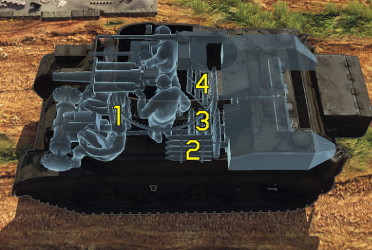
| Full ammo |
1st rack empty |
2nd rack empty |
3rd rack empty |
4th rack empty |
Visual discrepancy |
|---|---|---|---|---|---|
| 46 | 35 (+11) | 23 (+23) | 12 (+34) | 1 (+45) | No |
Machine guns
The 12.7 mm M2HB is an excellent machine gun at this tier. It not only has the capability to threaten low-tier fighters and ground attack aircraft, but can even threaten armoured vehicles. Generally, the M2 should be saved for emergency situations against ground targets, as generally an HE or HEAT round is objectively more effective.
| 12.7 mm M2HB | ||||
|---|---|---|---|---|
| Mount | Capacity (Belt) | Fire rate | Vertical | Horizontal |
| Pintle | 400 (200) | 576 | -5°/+70° | ±180° |
Usage in battles
In general, the M8 Scott plays like a beefed-up M5A1. The massive increase in gun calibre and destructive potential gives it more flexibility when engaging heavier armoured targets. Like the M3/M5 Stuart, playing this tank aggressively will almost always guarantee a place on the leaderboard. Push for the cap and then take it without hesitation. Should an enemy get there first, enter the cap and flank the target. Get behind their turret and go for a shot to the turret rear. Once the capture point is held, find a good hull down position and use the 75 mm HEAT to destroy any and all oncoming tanks.
Against heavier armour, the need to find a good hidden position is critical. On certain tanks, the addition of track armour can give the M8 difficulty in penetrating them. Hence a good hull down position on their flank can provide a good position to hit their side armour, with almost certain destruction coming from it.
Tanks like the Panzer IV F2 and it's line of tanks can be a serious headache for the vehicle to encounter. Aim for the right side of their turret and knock-out their gunner first, then aim for the middle of their hull (upper or lower glacis works) for a final shot. Outside of that most of the heavy armour will be out of the M8's BR range, leaving most encountered vehicles viable to destroy.
Pros and cons
Pros:
- When hull-down its double layer turret front can bounce some low-calibre or low-penetrating shells like the Pz.IIs' 20 mm
- Speed and mobility akin to the M5A1 light tanks, allowing it to manoeuvre and flank with ease
- Great firepower: thanks to its HEAT shell, the M8 can handle every vehicle it faces
- Extremely rare gun depression of -20 degrees making it able to peek above almost every slope and launch surprise attacks
- Short reload time for the calibre allows quick follow-up shots
- Low muzzle velocity shell's parabolic path can allow for shooting over hills which can be surprisingly useful
- 12.7 mm heavy machine gun is very lethal at the battle rating as most tanks have thin armour, for example the BT-7, Marder
- Said 12.7 mm heavy machine gun is mounted on a pretty tall position allowing for firing over obstacles
Cons:
- Open-top turret exposes crew to overpressure and aircraft strafing fire
- Thin armour and tight crew makes it very vulnerable to tank destroyers that have APHE shells, like the SU-76
- Poor steering at high speeds
- Extremely slow turret traverse
- Shells have low muzzle velocity and huge drop, hard for shooting long-range or moving targets
History
Development
In United State's entry into World War II, the troops in the front lines require a support vehicle similar to those in use by the German forces in the form of the StuG III. The project for such vehicle began as a design submitted in late 1941, which was a M5 Light Tank mated with a howitzer on the hull front, designated the T41. This design didn't pass as the howitzer on the hull sacrificed crew protection. The design was revised on the same M5 light tank and instead had the M5 turret removed and replaced with an open-topped turret similar to the US tank destroyers M10 and M18, which mounted a 75 mm howitzer. This change caused the hatches for the driver and assistant driver to be placed on the glacis front rather than the hull roof. This design, called the T17E1 HMC was approved and put into production under the designation 75 mm Howitzer Motor Carriage M8, or the M8 Scott. The 75 mm M2 howitzer was the initial armament of the M8 before switching to the updated 75 mm M3 howitzer later in production. The howitzer was capable of firing smoke M89 or high-explosive M48 rounds, the vehicle could hold 46 of these 75 mm rounds. The M8 does not have any machine guns on the coaxial or hull-mounted area, but a .50 cal Browning was mounted on the rear right corner of the turret for infantry defense. The vehicle was put into production in April 1942 and continued until January 1944, of which a total of 1,778 units were produced by Cadillac only.
Combat usage
These vehicles would go on to serve in the Italian Campaign, European Campaign, and in the Pacific in the hands of the US Army. The M8 saw use in American service until the M7 Priest 105 mm self-propelled gun could be fielded in large numbers, which stopped the M8 production and service in American units. After being phased out of American service, the M8 was then given to the Free French forces that use them in the Western Front of the European operations. The French continue to use them all the way to 1954 in the French-Indochina conflict in use by South-Vietnamese forces. Other users of the M8 included the Khmers national army, Laos, China, and the Philippines.
Media
- Skins
- Images
- Videos
See also
External links
- [Wikipedia] Howitzer Motor Carriage M8
- [Tank Encyclopedia] H.M.C. M8 "Scott"
- [Military Factory] M8 Scott (Howitzer Motor Carriage M8)
| USA tank destroyers | |
|---|---|
| M10 | M10 GMC |
| M36 | M36 GMC · M36B2 |
| T95 | T28 · T95 |
| M109 | M109A1 |
| ATGM | LOSAT · M901 |
| Wheeled | M3 GMC · T55E1 |
| Other | M8 HMC · M50 · M56 |
| China | ▃LVT(A)(4) (ZIS-2) |


